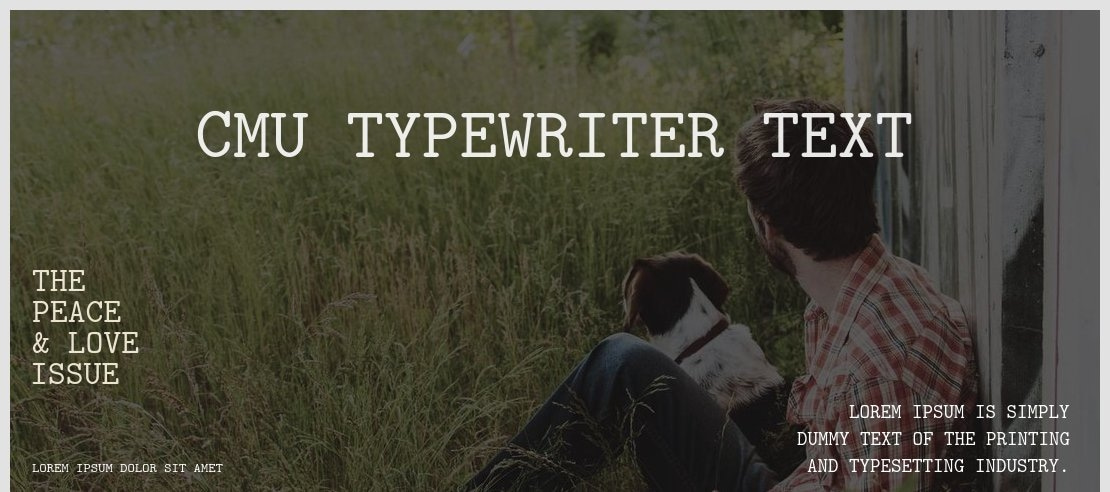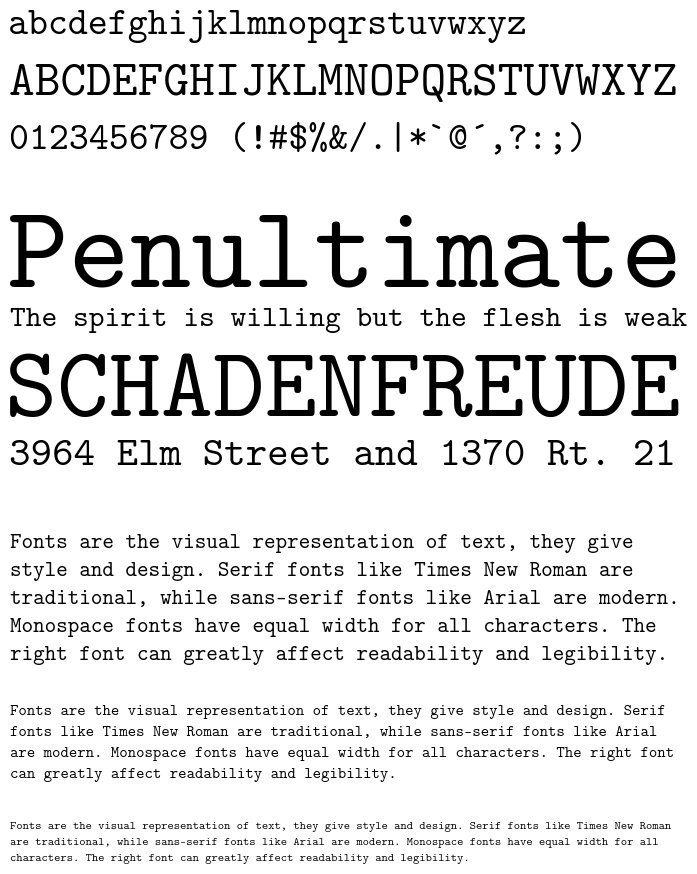CMU Typewriter Text Font Family
Uploaded by Neha Lang 𑁋 Sans-Serif Typeface

License
Available for Commercial UseDesigner
-From Wikipedia: Computer Modern is the original family of typefaces used by the typesetting program TeX. It was created by Donald Knuth with his Metafont program, and was most recently updated in 1992. Computer Modern, or variants of it, remains very widely used in scientific publishing, especially in disciplines that make frequent use of mathematical notation.
As implied by the name, Computer Modern is a 'Didone', or modern serif font, a genre that emerged in the late 18th century as a contrast to the more organic designs that preceded them. Didone fonts have high contrast between thick and thin elements, and their axis of "stress" or thickening is perfectly vertical. Computer Modern was specifically based on the 10 point size of the American Lanston Monotype Company's Modern Extended 8A, part of a family Monotype originally released in 1896. This was one of many modern faces issued by typefounders and Monotype around this period, and the standard style for body text printing in the late nineteenth century.
In creating the TeX publishing system, Knuth was influenced by the history of mathematics and a desire to achieve the "classic style" of books printed in metal type. Modern faces were used extensively for printing mathematics, especially before Times New Roman became popular for mathematics printing from the 1950s.
The most unusual characteristic of Computer Modern, however, is the fact that it is a complete type family designed with Knuth's Metafont system, one of the few typefaces developed in this way. The Computer Modern source files are governed by 62 distinct parameters, controlling the widths and heights of various elements, the presence of serifs or old-style numerals, whether dots such as the dot on the "i" are square or rounded, and the degree of "superness" in the bowls of lowercase letters such as "g" and "o". This allows Metafont designs to be processed in unusual ways; Knuth has shown effects such as morphing in demonstrations, where one font slowly transitions into another over the course of a text. While it attracted attention for the concept, Metafont has been used by few other font designers; digital font designer Jonathan Hoefler commented that "Knuth's idea that letters start with skeletal forms is flawed" and Knuth commented "asking an artist to become enough of a mathematician to understand how to write a font with 60 parameters is too much."
Variants
CMU Typewriter Text Regular

CMU Typewriter Text Light

CMU Typewriter Text LightOblique

CMU Typewriter Text Italic

CMU Typewriter Text Bold

CMU Typewriter Text BoldItalic

CMU Concrete Roman

CMU Sans Serif Medium

CMU Serif Upright Italic UprightItalic

CMU Typewriter Text Variable Width Medium

CMU Serif Roman

CMU Bright Roman

CMU Classical Serif Italic

CMU Concrete Italic

CMU Sans Serif Oblique

CMU Typewriter Text Variable Width Italic

CMU Serif Italic

CMU Serif Extra RomanSlanted

CMU Bright Oblique

CMU Sans Serif Demi Condensed DemiCondensed
CMU Bright SemiBold

CMU Bright SemiBoldOblique

CMU Concrete Bold

CMU Sans Serif Bold

CMU Serif Bold

CMU Concrete BoldItalic

CMU Sans Serif BoldOblique

CMU Serif BoldItalic

CMU Serif Extra BoldSlanted


Image Generator:
Customize and Visualize Your Texts!
Image Generator is a captivating service that empowers you to unleash your creativity by fully customizing your texts and visualizing them in a wide range of formats. This impressive tool puts you in control, allowing you to fine-tune font styles, sizes, background and font colors, as well as the text content itself.
With Image Generator, you can create mesmerizing texts by customizing the background and font colors to your heart's desire. Choose your favorite colors or explore diverse color palettes to achieve captivating color harmonies that truly reflect the essence of your projects or brand.
Image Generator provides outputs in SVG and PNG formats, tailored to your preferences. The SVG format preserves the quality of your texts as vector-based graphics, ensuring no loss of detail or sharpness when resizing. On the other hand, the PNG format delivers high-quality raster images, enabling you to showcase your designs flawlessly on websites, social media platforms, or printed materials.
Get ready to captivate your audience with Image Generator, where your imagination has no limits and your texts become works of art.
License
This Font Software is licensed under the SIL Open Font License, Version 1.1. This license is copied together with this font package in OFL.txt, and is also available with a FAQ at: http://scripts.sil.org/OFL
Converted by Andrey V. Panov from TeX fonts. Some glyphs are copied from Blue Sky fonts released by AMS.
Similar Fonts
Latin Modern Mono
Added by Mariano Jacobson (17 Styles)
Out of sight
Added by deron (1 Style)
CQ Mono
Added by Joyce Wilderman (1 Style)
WarText
Added by boehm.celestine (1 Style)
CQ Mono
Added by ichamplin (1 Style)
GVB Bus Pid
Added by Easton Yost (1 Style)





